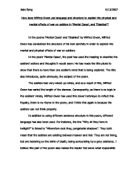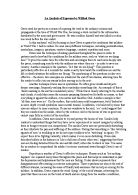The tone is somber throughout unlike Owen’s Apologia pro Poemate Meo in which there is a generally austere tone but peace and beauty are spoken of as the poem develops and romantic imagery is used, albeit ironically, to discuss the realities of war. These light-hearted sentiments give the reader a break from Owen’s grave message of the horror of war. In exposure however, there are no such intermissions. The intensity of the poem is maintained throughout and this is indeed a key way in which Owen explores the harsh realties of war. “Northward, incessantly, the flickering gunnery rumbles,” again Owen’s meaning here is clear. Firstly, the word “incessantly” underpins Owen’s message in this line, it indicates the constant terror the soldiers felt. The constant terror of the soldiers is also reflected in the constant intensity of the poem. There is significance in the word “Northwards” in that it is a continuation from the afore mentioned “iced east winds”. Owen creates this image to allow the reader to feel as if they are being attacked on all flanks, to feel as if they are surrounded. Although, terror is ever-present in the poem it fluctuates for dramatic effect. The word “rumbles” is used as a half-rhyme with the word “brambles” from the previous line. As “brambles” is a heavier sound it creates a tone of increasing intensity. This is Owen’s way of informing the audience of the series irregular emotions experienced at war and the word flickering of course signifies a fast-past movement showing the manner in which the emotions of the soldier can rapidly change. This technique is used by Owen in the first line of the fourth stanza where the fast-paced sibilance of “Sudden successive flights of bullets streak” is juxtaposed with the word “silence” in the same line. The word “silence” adds to the sibilating effect and yet stems the intensity of the poem as silence greatly contrasts with the action in the same line. The reader can hear the whistling of bullets into the trenches which is followed by silence. The line is ended here. The audience reads on with anticipation to find out what happens next. Owen and the soldiers experienced a similar kind of anticipation whilst at war.
The anticipation of the soldiers is met anti-climatically by the refrain of “but nothing happens” throughout the poem. Owen is suggesting that this is part of the misery of war – waiting for death. In the next line a gun assault described as “less deathly than air” or in other words there were no casualties. This suggests that the Owen was in fact expecting death. The sentence is negative as the word “less” is used. The audience gains the impression that It almost seems as if the soldiers are disappointed that the attack did not cause death. Arguably, Owen is implying that there were suicidal tendencies amongst the soldiers.
The poem as whole is written from the perspective of the soldier and each stanza reflects what the soldiers are thinking and the last line of each stanza is a summarising conclusion. For example in the second stanza the hardship of war is described through the personification of the wind as an enemy with the phrase “mad gusts” and the poet also describes the “twitching agonies of men”, both these descriptions reflect what the soldiers are thinking. The stanza goes on to be ended by the words “What are we doing here?”. This technique is repeated by Owen in every stanza and is occasionally made even more obvious by repetition of the refrain “But nothing happens” at the end of every stanza. This structure is such that that the mental anguish of the men is described by Owen and then reinforced by the refrain. Through technique Owen’s message becomes clear: the soldiers experience harsh conditions and mental anguish – this is one of the realities of war. This technique perhaps appears didactic and heavy-handed but it does well to convey the poet’s point. I believe that it was an intentional attempt to make the meaning of the poem as clear as possible as oppose to an inability to use skilled writing.
The fast-paced stanza and the anti-climatic refrain is a key technique Owen uses in the poem because it highlights the main themes of the poem; terror and anticipation. Through this technique we understand that it is the purpose of Owen’s poem to inform the reader of the harsh realities of war and thus convince us that war is foolish and wrong which is the underlying implication of all Owen’s poems. The poem is an elaborate and artistic moral claim that war is wrong. This claim is motivated by his personal and traumatizing experience at war and was written both as a therapeutic experience for Owen and as a vent for his anger and resentment to war which is typified in the poem’s blunt tone. Owen also saw himself as a heraldic truth-bearer against the backdrop of the war-time propaganda. So Owen’s experiences in exposure are not only an expression of his personal trauma but also a prophecy of what men would experience if they joined the war. We learn from Owen’s other poems that he has a particular conviction to dissuade young men from joining the war as in Arms and the Boy and Anthem for Doomed Youth where this intention is apparent even from the title. Owen’s poems act as an anti-thesis to the lies of the British government in portraying war as patriotic heroism, but instead Owen depicts in his poem the harsh realities of war undoubtedly based the poet’s own empirical observations giving his writing an air of credibility. Overall we can see that Owen is effective in persuading the reader that the scenes he has described are not solely founded in emotion but are indeed depictions of the harsh realities of war.
An alternative explanation is that Owen wrote exposure purely to give vent to his anger and resentment of God and war and not to dissuade potential recruits from joining the war. In context this is a valid viewpoint because after Owen suffered shell-shock and had recuperated at Craiglockhart hospital in Edinburgh he choose to return to the frontline although he might have stayed indefinitely on home service. If Owen had believed that war is wrong and foolish it is most likely that he would not have returned to war. In fact, was awarded the Military Cross for his service in the war and was publicly commended by his superior officers in a newspaper, it read: “2nd Lt, Wilfred Edward Salter Owen, 5th Bn. Manch. R., T.F., attd. 2nd Bn.For conspicuous gallantry and devotion to duty in the attack on the Fonsomme Line on October lst/2nd, 1918. On the company commander becoming a casualty, he assumed command and showed fine leadership and resisted a heavy counter-attack. He personally manipulated a captured enemy machine gun from an isolated position and inflicted considerable losses on the enemy. Throughout he behaved most gallantly.”
Owen was encouraged to write about the experiences particularly the ones he relived in his dreams by his doctor Arthur Brock as a therapeutic experience this may explain why exposure is laden with emotion particularly anger and resentment. Also, perhaps Owen’s satirical style can be attributed to not an attempt to mock government propaganda but to his attempt to imitate the realistic and satirical style of his esteemed mentor Siegfried Sassoon. Although this point is arguably flawed as Owen makes a more explicit attempt to mock government propaganda in his poem Disabled:
“How cold and late it is! Why don’t they come And put him into bed? Why don’t they come?”
This is satirical of the propaganda posters that read “When will the next troops come?” which was attempt by the government to persuade potential troops to fight in the war that were not amongst the first to enlist. The quotation is satirical of the posters as here Owen is implying that if someone should become disabled as a result of the war there concern will be not with the war but how the hospital staff cares for them.
Exposure explores the harsh realities of war principally through vivid descriptions from the perspective of the soldiers and although Owen often makes his meaning explicit, his poetic intentions are somewhat more subject to interpretation. Ultimately, the poem is a literary manifestation of Owen’s traumatic experiences and thus is able to effectively explore war because Owen had lived through and dwelled upon the harsh realities that he wrote about.








